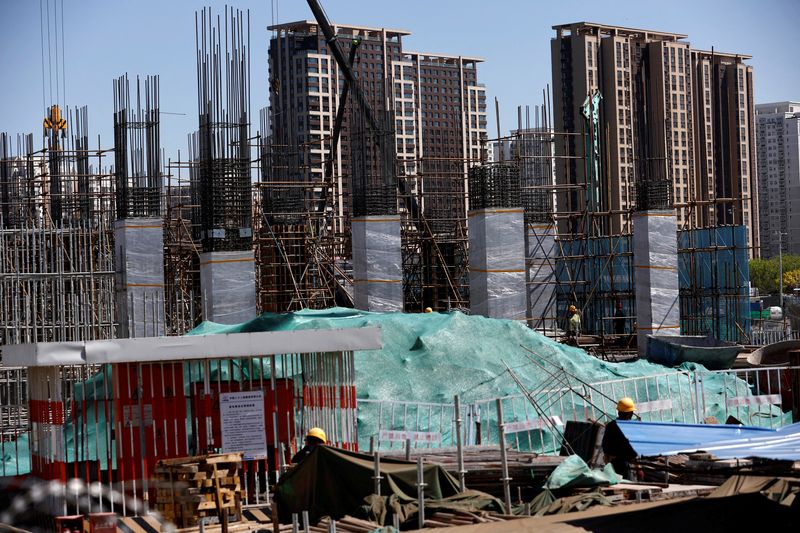By Jason Xue and Tom Westbrook
SHANGHAI/SINGAPORE (Reuters) - Pressure is mounting on China's cash-strapped local governments as authorities move to shut a private funding route for their financing arms, according to planned new rules and people familiar with their aims, raising credit risks and default worries.
Beijing has been tightening rules on local government borrowing for years, curbing access to bank loans and bonds and driving their financing vehicles deeper into private markets to raise money.
One such channel, where fund managers have been selling largely illiquid high-yielding debts from local government financing units, is the next to be shut off.
The move is the newest effort at reining in the sector's $9.5 trillion in debt, but comes with Beijing relying on its spending to help a sputtering economy and raises risks in what analysts have dubbed the "black hole" of China's finances.
Technical changes published in draft rules by the Asset Management Association of China (AMAC) in late April with major industry ramifications show private funds would be barred from investing more than 25% of their net assets in a single bond, or receiving middleman commissions from issuers.
The draft from the self-regulating association of fund managers said the new rules were designed to better regulate operation of China's private funds, whose products typically require minimum investments of 1 million yuan ($140,000).
AMAC did not respond immediately to a request for comment to provide more details including an expected date for a final decision.
But market participants said the rules appear aimed specifically at a popular structure for bond fund managers to funnel cash to local government financing vehicles (LGFVs).
"Such measures are well-intended ... but could worsen LGFVs' credit environment," said Zhu Yangmo, partner of bond-focused Shan Ze Fund Management Co, whose funds invest in high-yield corporate bonds using fundamental analysis.
"That's why we're getting more and more cautious toward LGFV bonds ... as default risks in fiscally weak regions rise."
Zhu estimates a quarter of China's roughly 270 high-yield bond focused private fund companies could be helping LGFVs raise money by structuring special funds worth about $7 billion.
Under AMAC's new rules, "such fund managers could hardly survive unless they transform their business model," she said.
LGFVs, meanwhile, set up by local governments to fund infrastructure investment, are already struggling to meet repayment obligations in a slowing economy as sluggish land sales weighed on municipalities' income and balance sheets.
The squeeze leaves authorities walking a tightrope as they try to whittle back debts that the International Monetary Fund says totals $9.5 trillion, without triggering a collapse or credit crunch with wide-ranging economic and market fallout as restructurings and defaults in the private market begin to mount.
"We believe credit amongst LGFVs remains challenged, and negative news could lead to a repricing of tail risks," Goldman Sachs (NYSE:GS) analysts said.
CREATIVE REFINANCING
Local governments' debts have long been a nagging risk to financial stability, though deep concern has mostly been staved off by LGFVs ability to creatively refinance despite tightening regulations. Private funds have been one such channel.
Private funds are registered at AMAC, so "on the surface, look completely legitimate," said a bond fund manager who declined to be identified due to sensitivity of the topic.
But, he said, instead of buying a diversified portfolio, many funnel money into single LGFV bonds, typically earning underwriting fees in addition to management fees, a conflict of interest and a structure with high exposure to credit risks.
One such product currently on sale is launched by Shanghai Ling Jing Investment, which invests solely in a bond issued by Shouguang City Construction Investment Development, an LGFV in Shandong yields 7.5% over two years. The yield on China's two-year sovereign bonds is 2.2%.
"Ensuring issuance and repayment of LGFV bonds is one of the most important tasks for local governments," according to the sales pitch, which sails close to Beijing's edict that LGFVs cannot raise money relying on implicit government guarantees.
To be sure, there are other fundraising channels, such as a previously quiet corner of an offshore bond market in Shanghai that has recently lit up with LGFV issuance, and investors expect local authorities to keep finding ways to pay their debts.
But the impending push shows regulators' determination to rein debts is unwavering and it adds to pressure and risk.
"Regulators are seeking to shield individuals from LGFV debt risks, because footing the bill is very painful for such investors, and could be beyond their ability," said Yao Yu, founder of credit analysis firm Ratingdog.
"If you stop such financing, you go belly up. But if you keep borrowing through such channels, you will not end well either," Yu said.
And for investors, there are already problems. One, who gave only his family name of Jiang, said he and his relatives invested several million yuan into an investment product with an 8% yield sold by Gaomi Urban Construction Investment Group, another Shandong LGFV, and are fighting to get their overdue principal back after a default.

"We were told getting money back is a matter of time, as such LGFVs indeed have no money to repay debts."
($1 = 7.1763 Chinese yuan renminbi)